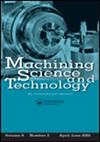Machinability study on dry machining of white cast iron by polycrystalline cubic boron nitride inserts
IF 2.6
4区 工程技术
Q2 ENGINEERING, MANUFACTURING
引用次数: 1
Abstract
Abstract The polycrystalline cubic boron nitride (PCBN) insert has been widely used in machining high chromium white cast iron (HCCI), which has the high hardness and abrasiveness. The aim of this article is to reveal that micro-mechanical properties play an essential role in assessing the machinability of high chromium cast iron. Grid nanoindentation is applied to measure the micro-hardness distribution. Based on grid nanoindentation results, the micro-hardness distribution is proposed to study the machinability. After the machining test of HCCI by the PCBN insert, the cutting force, tool wear, surface roughness, and chip formation showed that the micro-hardness distribution of materials has the better results than macro-hardness in machinability evaluation, and abrasive wear occurred on the rake and flank face of the cutting tool. The abrasiveness index that is related with the micro-hardness distribution and the abrasive wear effect in machining, for the most of high abrasion materials, has the possible to evaluate the dynamic cutting process and tool life in dry machining by using the PCBN insert. The micro-hardness distribution imported into the machinability model may propose a new way to improve the data exchange capability in the modern manufacturing process.多晶立方氮化硼刀片干式加工白口铸铁的可加工性研究
摘要多晶立方氮化硼(PCBN)刀片具有较高的硬度和耐磨性,在加工高铬白口铸铁(HCCI)中得到了广泛的应用。本文的目的是揭示微观力学性能在评价高铬铸铁的可加工性中起着至关重要的作用。采用网格纳米压痕法测量显微硬度分布。在网格纳米压痕结果的基础上,提出了研究可加工性的显微硬度分布。PCBN刀片对HCCI进行加工试验后,切削力、刀具磨损、表面粗糙度和切屑形成表明,材料的显微硬度分布在可加工性评价方面优于宏观硬度,刀具前刀面和刀面出现磨粒磨损。对于大多数高磨耗性材料,与显微硬度分布和磨料磨损效果相关的磨耗性指标,有可能通过使用PCBN刀片来评价干式加工中的动态切削过程和刀具寿命。将显微硬度分布引入可加工性模型,为提高现代制造过程中的数据交换能力提供了一种新的途径。
本文章由计算机程序翻译,如有差异,请以英文原文为准。
求助全文
约1分钟内获得全文
求助全文
来源期刊

Machining Science and Technology
工程技术-材料科学:综合
CiteScore
5.70
自引率
3.70%
发文量
18
审稿时长
6 months
期刊介绍:
Machining Science and Technology publishes original scientific and technical papers and review articles on topics related to traditional and nontraditional machining processes performed on all materials—metals and advanced alloys, polymers, ceramics, composites, and biomaterials.
Topics covered include:
-machining performance of all materials, including lightweight materials-
coated and special cutting tools: design and machining performance evaluation-
predictive models for machining performance and optimization, including machining dynamics-
measurement and analysis of machined surfaces-
sustainable machining: dry, near-dry, or Minimum Quantity Lubrication (MQL) and cryogenic machining processes
precision and micro/nano machining-
design and implementation of in-process sensors for monitoring and control of machining performance-
surface integrity in machining processes, including detection and characterization of machining damage-
new and advanced abrasive machining processes: design and performance analysis-
cutting fluids and special coolants/lubricants-
nontraditional and hybrid machining processes, including EDM, ECM, laser and plasma-assisted machining, waterjet and abrasive waterjet machining
 求助内容:
求助内容: 应助结果提醒方式:
应助结果提醒方式:


